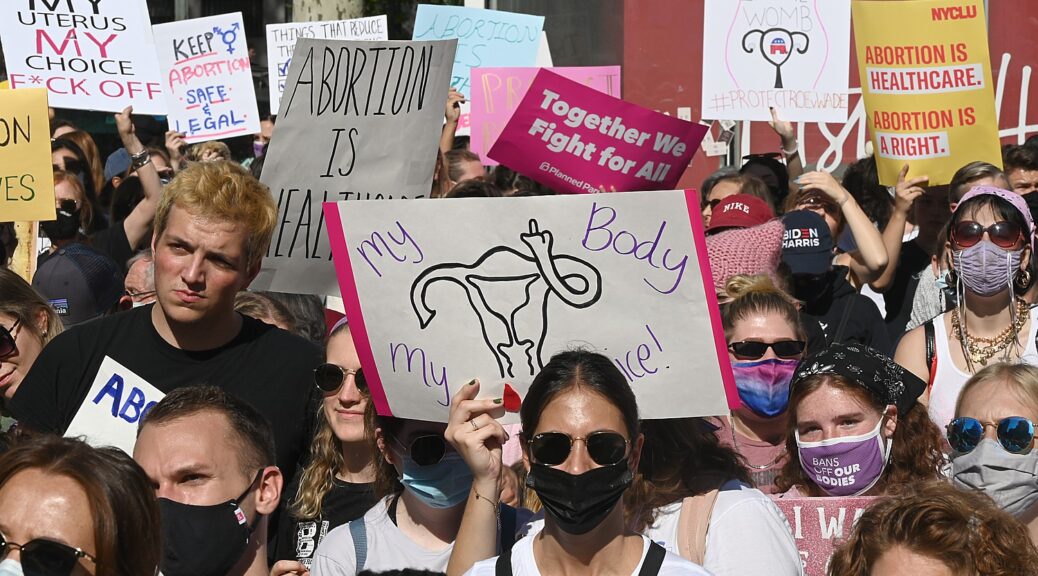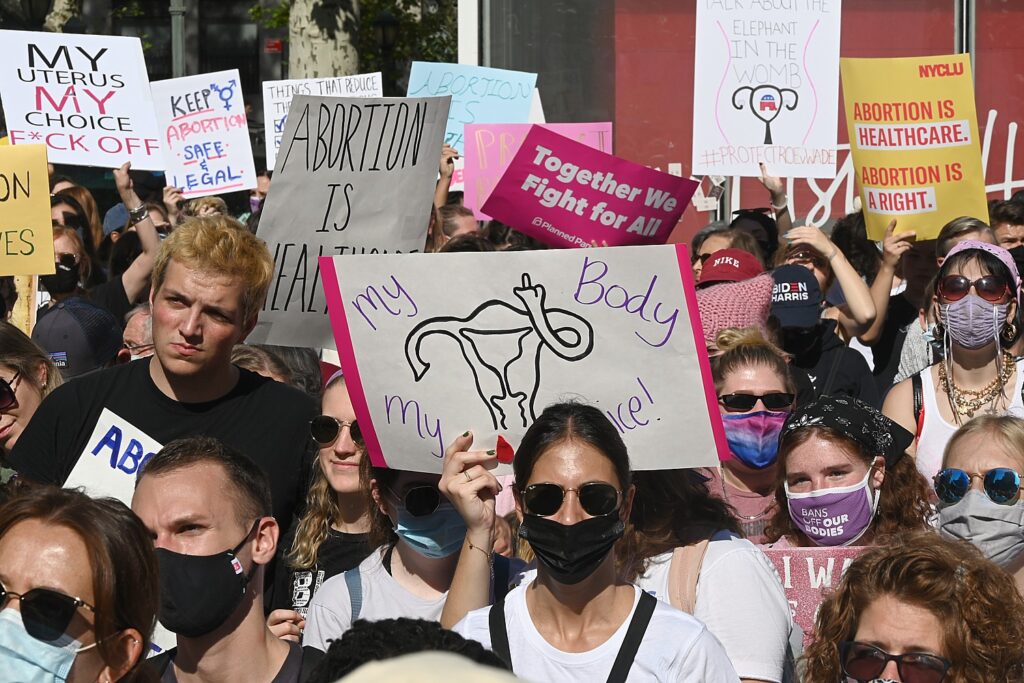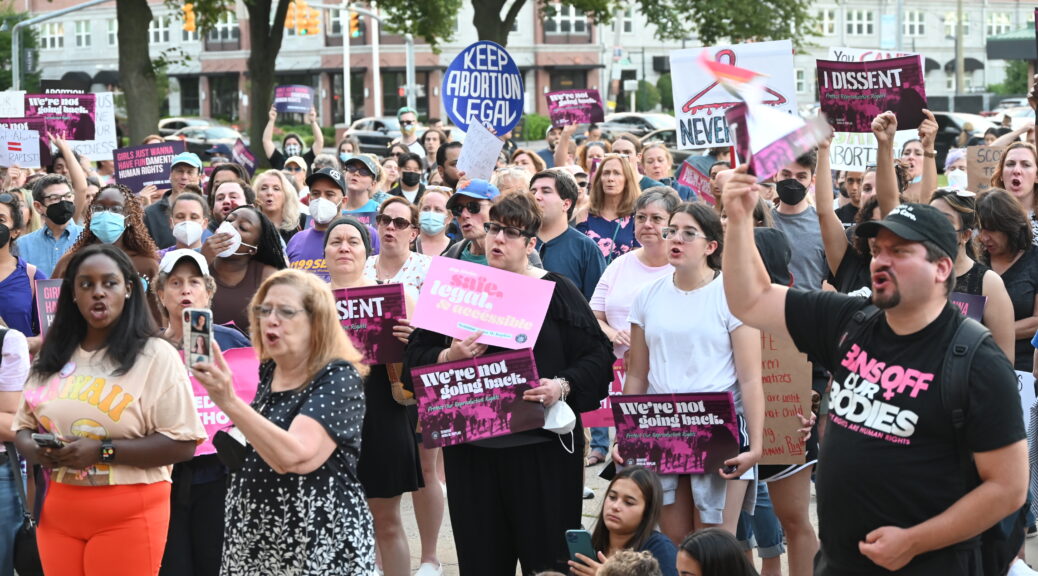
Biden-Harris Administration Announces New Actions to Help Strengthen Access to Contraception, Protect Access to Medication Abortion, and Ensure Patients Receive Emergency Medical Care
Today, on what would have been the 51st anniversary of Roe v. Wade, women’s health and lives hang in the balance due to extreme state abortion bans. These dangerous state laws have caused chaos and confusion, as women are being turned away from emergency rooms, forced to travel hundreds of miles, or required to go to court to seek permission for the health care they need.
In the face of the continued threats to reproductive freedom, President Biden convened the fourth meeting of the Task Force on Reproductive Healthcare Access, where agencies announced new actions to protect access to reproductive health care. The Task Force also heard directly from physicians who are on the frontlines of the fallout from the overturning of Roe v. Wade.
Opening the meeting, President Biden declared:
Fifty-one years ago today, in Roe v. Wade, the Supreme Court recognized a woman’s constitutional right to choose — constitutional right to choose — the right to make a deeply personal decision with her doctor, free from the interference of politicians. I believe Roe v. Wade was right. But then, a year and a half ago, this Supreme Court made an extreme decision, overturning Roe with their Dobbs decision, to rip away a constitutional right from the American people, which had never been done before — a fundamental right ripped away — important to so many Americans, a right that is vital to a country founded on the idea of freedom.
I said on that day that Roe was overturned, the health and lives of women in this nation would now be at risk. And that has unfortunately proven to be true…Today, in 2024 in America, women are turned away from emergency rooms, forced to travel hundreds of miles to get basic healthcare in another state that may have a different rule, forced to go to court to plead for help…
The cruelty is astounding — an affront to a woman’s dignity, being told by extreme politicians to wait, to get sicker and sicker to the point where her life may be in danger before you can get the care you need. That cruel reality is the result of extreme Republicans who, for years, have made it their mission to end the Roe v. Wade decision.
Since Roe was overturned, in 21 states, abortion bans are now in effect, many with no exception for rape or incest. We have doctors with us today who are on the frontlines of this crisis. And they can attest to the consequences that these extreme laws are having on doctors and on their ability to care for their patients. Some doctors are fleeing their home states because of laws that would send them to prison for providing evidence-based healthcare. In states like Texas, doctors can get a life sentence — a life sentence for providing the care they were trained to provide. It’s outrageous. It’s simply outrageous.
And, frankly, this is just the beginning. My congressional Republican friends are going to even further extremes to undermine a woman’s rights and threatening the lives of women. Three different Republican members in the United States Congress have proposed three different additional national bans to criminalize healthcare in every state. Let me tell you what they are.
One is a zero-week ban with absolutely no exceptions — a zero-week with absolutely no exceptions. The second is a six-week ban. The penalty for violating it is jail. The third is a 15-week ban. The penalty is a five-year prison sentence.
That means even if you live in a state where the extremist Republicans are not running the show, your right to choose, your right to privacy would still be at risk if this law was passed — any of these were passed nationally.
And the extreme right is trying to limit all women in America from getting a safe and effective medication, approved by the Federal Drug Administration over 20 years ago based on the FDA’s independent expert judgment. They’re trying to block women from getting this medication even in states where abortion is legal.
And on top of all of that, if you live in a state where you cannot get this care you need and you make a plan to travel to a state where you can get the[medical care],[Republican officials] are trying to stop that as well. In Alabama the Attorney General is threatening to prosecute people who help family members travel to another state.
Folks, this is what it looks like when the right to privacy is under attack. These extreme laws have no place in the United States of America.
You know, the American people know these laws are wrong. The vast majority of Americans believe the right to choose is fundamental.
Also today, the Vice President launch her nationwide Fight for Reproductive Freedoms tour to continue fighting back against extreme attacks throughout America. “These extremists want to roll back the clock to a time before women were treated as full citizens,” she declared at the kick-off event in Waukesha County, Wisconsin, 51 years to the day that Roe v. Wade was decided.
“As we face this crisis, as we are clear eyed about the harm, let us also understand who is responsible, shall we? The former president hand picked three Supreme Court justices because they intended for them to overturn Roe. .. Proud? Proud? Proud that women across our nation are suffering? Proud that women have been robbed of a fundamental freedom? Proud that doctors could be thrown in prison for caring for their patients, that young people today have fewer rights than their mothers and their grandmothers? How dare he?” the Vice President declared.
Biden-Harris Administration Actions to Protect Reproductive Health Care
During the Task Force meeting, members reported on ongoing implementation of the President’s three Executive Orders and a Presidential Memorandum on access to reproductive health care and announce new steps to:
- Strengthen Contraception Access and Affordability for Women with Private Health Insurance. The Administration is committed to ensuring that women have access to contraception—an essential component of reproductive health care that has only become more important in the wake of the Supreme Court’s decision to overturn Roe v. Wade—and reducing barriers that women face in accessing contraception prescribed by their provider. The Departments of the Treasury, Labor, and Health and Human Services (HHS) are issuing new guidance to clarify standards and support expanded coverage of a broader range of FDA-approved contraceptives at no cost under the Affordable Care Act. This action builds on the progress already made by the Affordable Care Act to expand access to affordable contraception for millions of women nationwide.
In addition, the Office of Personnel Management will strengthen access to contraception for federal workers, retirees, and family members by issuing guidance to insurers participating in the Federal Employee Health Benefits Program that incorporates the Departments’ guidance. OPM will also newly require insurers that participate in the Federal Employee Health Benefits Program to take additional steps to educate enrollees about their contraception benefits.- Reinforce Obligations to Cover Affordable Contraception. The Secretary of HHS is issuing a letter to private health insurers, state Medicaid and Children’s Health Insurance Programs, and Medicare plans about their obligations to cover contraception for those they serve. The letter targets a wide range of payers to advance compliance with existing standards and underscore the Administration’s commitment to ensuring that women across the country can access affordable contraception. The letter also highlights recent HHS action to expand coverage and improve payment for contraceptives for Medicare beneficiaries, improving access for women with disabilities.
Educate Patients and Health Care Providers on Their Rights and Obligations for Emergency Medical Care. The Administration is committed to helping ensure all patients, including women who are experiencing pregnancy loss and other pregnancy-related emergencies, have access to emergency medical care required under the Emergency Medical Treatment and Labor Act (EMTALA). The Administration has long taken the position that the required emergency care can, in some circumstances, include abortion care. The Department of Justice (DOJ) is defending that interpretation of the law before the Supreme Court, which is expected to rule by June.
To increase awareness of EMTALA and improve the procedures for ensuring that patients facing all types of medical emergencies receive the care to which they are entitled, HHS is announcing today a comprehensive plan to educate all patients about their rights and to help ensure hospitals meet their obligations under federal law. This effort will include the launch of new accessible and understandable resources about rights and protections for patients under EMTALA and the process for submitting a complaint. HHS will also disseminate training materials for health care providers and establish a dedicated team of experts who will increase the Department’s capacity to support hospitals and providers across the country in complying with federal requirements—to help ensure that every patient receives the emergency medical care required under federal law.
- Reinforce Obligations to Cover Affordable Contraception. The Secretary of HHS is issuing a letter to private health insurers, state Medicaid and Children’s Health Insurance Programs, and Medicare plans about their obligations to cover contraception for those they serve. The letter targets a wide range of payers to advance compliance with existing standards and underscore the Administration’s commitment to ensuring that women across the country can access affordable contraception. The letter also highlights recent HHS action to expand coverage and improve payment for contraceptives for Medicare beneficiaries, improving access for women with disabilities.
- Protect Access to Safe and Legal Medication Abortion. One year ago today, President Biden issued a Presidential Memorandum directing further efforts to support patients, providers, and pharmacies who wish to legally access, prescribe, or provide medication abortion—including by taking steps to safeguard their safety and security. Today, the Department of Health and Human Services, the Department of Justice, and the Department of Homeland Security will report on their implementation of this Presidential Memorandum, including the resources they have disseminated to health care providers, including pharmacies, to support safe access to legal medication abortion.
Today’s announcements build on the Administration’s strong record of taking action since the Supreme Court’s decision to overturn Roe v. Wade. These ongoing efforts to defend reproductive rights include:
Protecting Access to Abortion, including Medication Abortion
- Defend FDA Approval of Medication Abortion in Court. The Food and Drug Administration (FDA) and DOJ are defending access to mifepristone—a safe and effective drug used in medication abortion that FDA first approved more than twenty years ago—and FDA’s independent, expert judgment in court, including in a lawsuit before the Supreme Court that attempts to curtail access nationwide. The Administration will continue to stand by FDA’s decades-old approval and regulation of the medication and by FDA’s ability to review, approve, and regulate a wide range of prescription medications. Efforts to impose outdated restrictions on mifepristone would limit access to reproductive health care in every state in the country.
- Protect Access to Safe and Legal Medication Abortion. On what would have been the 50th anniversary of Roe v. Wade, President Biden issued a Presidential Memorandum directing agencies to consider further efforts to protect access to medication abortion. This Presidential Memorandum was issued in the face of attacks by state officials to prevent women from accessing mifepristone and discourage pharmacies from becoming certified to dispense the medication. These attacks followed independent, evidence-based action taken by FDA to allow mifepristone to continue to be prescribed by telehealth and sent by mail as well as to enable interested pharmacies to become certified.
- Partner with State Leaders on the Frontlines of Abortion Access. The White House continues to partner with leaders on the frontlines of protecting access to abortion—both those fighting extreme state legislation and those advancing proactive policies to protect access to reproductive health care, including for patients who are forced to travel out of state for care. The Vice President has led these efforts, traveling to 20 states and meeting with more than 250 state legislators, health care providers, and advocates in the past year. Today, she is kicking off her nationwide Fight for Reproductive Freedoms tour in Wisconsin.
- Ensure Access to Emergency Medical Care. Republican elected officials in states across the country have put women’s lives at risk by banning abortion even when her doctor determines that an abortion is necessary to prevent serious health consequences. The Administration is committed to ensuring all patients, including women who are experiencing pregnancy loss and other pregnancy-related emergencies, have access to the full rights and protections for emergency medical care afforded under federal law—including abortion care when that is the stabilizing treatment required. HHS issued guidance and Secretary Becerra sent letters to providers affirming the Administration’s view that EMTALA preempts conflicting state law restricting access to abortion in emergency situations. The Department of Justice has taken action defend and enforce these protections in court, including in a case currently before the Supreme Court.
- Provide Access to Reproductive Health Care for Veterans. The Department of Veterans Affairs (VA) issued an interim final rule to allow VA to provide abortion counseling and, in certain circumstances, abortion care to veterans and VA beneficiaries. VA provides abortion services when the health or life of the patient would be endangered if the pregnancy were carried to term or when the pregnancy is a result of rape or incest. When working within the scope of their federal employment, VA employees may provide abortion services as authorized by federal law regardless of state restrictions. DOJ will support and provide representation to any VA providers whom states attempt to prosecute for violations of state abortion laws where those providers were appropriately carrying out their duties under VA’s interim final rule.
- Support Access to Care for Service Members. The Department of Defense (DoD) has taken action to ensure that Service members and their families can access reproductive health care and that DoD health care providers can operate effectively. DoD has released policies to support Service members and their families’ ability to travel for lawful non-covered reproductive health care and to bolster Service members’ privacy and afford them the time and space needed to make personal health care decisions.
- Defend Reproductive Rights in Court. DOJ created a Reproductive Rights Task Force, which monitors and evaluates state and local actions that threaten to infringe on federal protections relating to the provision or pursuit of reproductive health care, impair women’s ability to seek abortion care where it is legal, impair individuals’ ability to inform and counsel each other about the care that is available in other states, ban mifepristone based on disagreement with FDA’s expert judgment about its safety and efficacy, or impose criminal or civil liability on federal employees who provide legal reproductive health services in a manner authorized by federal law.
- Protect Access to Safe and Legal Medication Abortion. On what would have been the 50th anniversary of Roe v. Wade, President Biden issued a Presidential Memorandum directing agencies to consider further efforts to protect access to medication abortion. This Presidential Memorandum was issued in the face of attacks by state officials to prevent women from accessing mifepristone and discourage pharmacies from becoming certified to dispense the medication. These attacks followed independent, evidence-based action taken by FDA to allow mifepristone to continue to be prescribed by telehealth and sent by mail as well as to enable interested pharmacies to become certified.
Supporting Women’s Ability to Travel for Medical Care
- Defend the Right to Travel. On the day of the Supreme Court’s decision to overturn Roe v. Wade, President Biden reaffirmed the Attorney General’s statement that women must remain free to travel safely to another state to seek the care they need. In November 2023, DOJ filed a statement of interest in two lawsuits challenging the Alabama Attorney General’s threat to prosecute people who provide assistance to women seeking lawful out-of-state abortions. DOJ explained that the threatened Alabama prosecutions infringe the constitutional right to travel and made clear that states may not punish third parties for assisting women in exercising that right. DOJ continues to monitor states’ efforts to restrict the constitutional right to travel across state lines to receive lawful health care.
- Support Patients Traveling Out of State for Medical Care. HHS issued a letter to U.S. governors inviting them to apply for Section 1115 waivers to expand access to care under the Medicaid program for women traveling from a state where reproductive rights are under attack and women may be denied medical care. HHS continues to encourage state leaders to consider and develop new waiver proposals that would support access to reproductive health care services.
Safeguarding Access to Contraception
- Strengthen Access to Affordable, High-Quality Contraception. Ahead of the one-year anniversary of the Supreme Court’s decision to overturn Roe v. Wade, the President issued an Executive Order directing agencies to consider actions to improve access and affordability for women with private health insurance; promote increased access to over-the-counter contraception; support access to affordable contraception through Medicaid and Medicare; ensure Service members, veterans, and Federal employees are able to access contraception; bolster contraception access across Federal health programs; and support access for college students and employees. These are just some of the recent actions taken by the Biden-Harris Administration to implement this Executive Order:
- Following FDA’s approval of the first daily oral contraceptive in the United States without a prescription, the Departments of the Treasury, Labor, and HHS issued a Request for Information to solicit public input on how to best ensure coverage and access to over-the-counter preventive services, including contraception, at no cost and without a prescription from a health care provider.
- Vice President Harris and the Department of Education convened representatives from 68 college and university leaders in 32 states to hear promising strategies from leaders of postsecondary institutions for protecting and expanding access to contraception for their students and on campus.
- The Gender Policy Council, Domestic Policy Council, and leaders from the Departments of the Treasury, Labor, and HHS convened private sector leaders to stress the need to continue to build on the significant progress already made under the Affordable Care Act in expanding access to contraception and call on participants to take robust additional actions to improve access.
- The Health Resources and Services Administration proposed new data measures for federally funded health centers that, once finalized, will help ensure that patients are screened for contraception needs. Screening and data measures will help enhance the overall delivery of voluntary family planning and related services, which is a required primary health care service under federal law.
- The Office of Personnel Management launched a public education campaign to highlight contraception benefits available to federal employees and their family members.
- HHS is continuing its public-private partnership to expand access to contraception with Upstream, a national nonprofit organization that provides health centers with free patient-centered, evidence-based training and technical assistance to eliminate provider-level barriers to offering the full range of contraceptive options. To date, HHS has connected Upstream to nearly 100 health care clinics, resulting in partnerships that will help Upstream accelerate their national expansion to reach 5 million women of reproductive age every year.
- Clarify Protections for Women with Private Health Insurance. Under the Affordable Care Act, most private health plans must provide coverage for contraception and family planning counseling with no out-of-pocket costs. The Departments of the Treasury, Labor, and HHS convened a meeting with health insurers and employee benefit plans. These agencies called on the industry to meet their obligations to cover contraception as required under the law. Following this conversation, these agencies issued guidance to clarify protections for contraceptive coverage under the Affordable Care Act.
- Expand Access Under the Affordable Care Act. The Departments of the Treasury, Labor, and HHS proposed a rule to strengthen access to contraception under the Affordable Care Act so all women with private health coverage who need and want contraception can obtain it without cost sharing. Millions of women have already benefited from this coverage, which has helped them save billions of dollars on contraception.
- Support Title X Clinics. Last year, HHS provided $263 million to over 4,000 Title X clinics across the country to provide a wide range of voluntary, client-centered family planning and related preventive services. The Title X Family Planning Program remains a critical part of the nation’s safety net, providing free or low-cost services for 2.6 million clients in 2022.
- Promote Access to Contraception for Service Members and Their Families and Certain Dependents of Veterans. To improve access to contraception at military hospitals and clinics, DoD expanded walk-in contraceptive care services for active-duty Service members and other Military Health System beneficiaries, and eliminated TRICARE copays for certain contraceptive services. And VA proposed a rule to eliminate out-of-pocket costs for certain types of contraception through the Civilian Health and Medical Program of the Department of Veterans Affairs.
Promoting Safety and Security of Patients, Providers, and Clinics
- Promote Safety and Security of Patients, Providers and Clinics. DOJ continues to robustly enforce the Freedom of Access to Clinic Entrances Act, which protects the right to access and provide reproductive health services.
Safeguarding Privacy and Sensitive Health Information
- Strengthen Reproductive Health Privacy under HIPAA. HHS issued a proposed rule to strengthen privacy protections under the Health Insurance Portability and Accountability Act (HIPAA). As proposed, this rule would prevent an individual’s information from being disclosed to investigate, sue, or prosecute an individual, a health care provider, or a loved one simply because that person sought, obtained, provided, or facilitated legal reproductive health care, including abortion. By safeguarding sensitive information related to reproductive health care, the rule will strengthen patient-provider confidentiality and help health care providers give complete and accurate information to patients. Prior to the proposed rule, HHS issued guidance reaffirming HIPAA’s existing protections for the privacy of individuals’ protected health information.
- Take Action Against Illegal Use and Sharing of Sensitive Health Information. The Federal Trade Commission (FTC) has committed to enforcing the law against illegal use and sharing of highly sensitive data, including information related to reproductive health care. Consistent with this commitment, the FTC has taken several enforcement actions against companies for disclosing consumers’ personal health information, including highly sensitive reproductive health data, without permission.
- Help Consumers Protect Their Personal Data. The Federal Communications Commission (FCC) launched a new guide for consumers on best practices for protecting their personal data, including geolocation data, on mobile phones. The guide follows a Notice of Proposed Rulemaking issued by FCC that would strengthen data breach rules to provide greater protections to personal data. Separately, HHS issued a how-to guide for consumers on steps they can take to better protect their data on personal cell phones or tablets and when using mobile health apps, like period trackers, which are generally not protected by HIPAA.
- Protect Students’ Health Information. ED issued guidance to over 20,000 school officials to remind them of their obligations to protect student privacy under the Family Educational Rights and Privacy Act (FERPA). The guidance helps ensure that school officials—at federally funded school districts, colleges, and universities—know that, with certain exceptions, they must obtain written consent from eligible students or parents before disclosing personally identifiable information from students’ educational records, which may include student health information. The guidance encourages school officials to consider the importance of student privacy, including health privacy, with respect to disclosing student records. ED also issued a know-your-rights resource to help students understand their privacy rights for health records at school.
- Safeguard Patients’ Electronic Health Information. HHS issued guidance affirming that doctors and other medical providers can take steps to protect patients’ electronic health information, including their information related to reproductive health care. HHS makes clear that patients have the right to ask that their electronic health information generally not be disclosed by a physician, hospital, or other health care provider. The guidance also reminds health care providers that HIPAA’s privacy protections apply to patients’ electronic health information.
- Take Action Against Illegal Use and Sharing of Sensitive Health Information. The Federal Trade Commission (FTC) has committed to enforcing the law against illegal use and sharing of highly sensitive data, including information related to reproductive health care. Consistent with this commitment, the FTC has taken several enforcement actions against companies for disclosing consumers’ personal health information, including highly sensitive reproductive health data, without permission.
Reinforcing Nondiscrimination Protections under Federal Law
- Protect Students from Discrimination Based on Pregnancy. The Department of Education (ED) released a resource for universities reiterating their responsibilities not to discriminate on the basis of pregnancy or pregnancy-related conditions, including termination of pregnancy. This guidance reminds schools of their existing and long-standing obligations under Title IX.
- Strengthen Nondiscrimination in Healthcare. HHS issued a proposed rule to strengthen nondiscrimination in health care. The proposed rule would implement Section 1557 of the Affordable Care Act and affirms protections consistent with President Biden’s Executive Orders on nondiscrimination based on sexual orientation and gender identity.
Providing Access to Accurate Information and Legal Resources
- Ensure Easy Access to Reliable Information. HHS launched and maintains ReproductiveRights.gov, which provides timely and accurate information on people’s right to access reproductive health care, including contraception, abortion services, and health insurance coverage, as well as how to file a patient privacy or nondiscrimination complaint. DOJ also launched justice.gov/reproductive-rights, a webpage that provides a centralized online resource on the Department’s ongoing work to protect access to reproductive health care services under federal law.
- Hosted a Convening of Lawyers in Defense of Reproductive Rights. DOJ and the Office of White House Counsel convened more than 200 lawyers and advocates from private firms, bar associations, legal aid organizations, reproductive rights groups, and law schools across the country for a convening of pro-bono attorneys, as directed in the first Executive Order. Following this convening, reproductive rights organizations launched the Abortion Defense Network to offer abortion-related legal defense services, including legal advice and representation.
Promote Research and Data Collection
Use Data to Track Impacts on Access to Care. HHS convened leading experts to discuss the state of existing reproductive health research and what the data tells us about the impact of the overturning of Roe v. Wade, as well as the future of research on reproductive health care access. These convenings helped identify research gaps, opportunities for collaboration, and ways to bolster research efforts for both Federal agencies and external partners.





